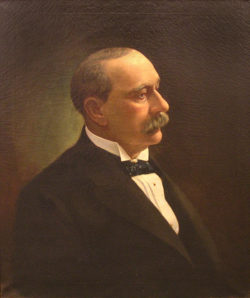Joseph A. Breaux
Joseph A. Breaux served as the chief justice of the Louisiana Supreme Court from 1904 to 1914.

Courtesy of The Law Library of Louisiana
Joseph A. Breaux. Molinary, Andres (Artist)
Joseph Arsenne Breaux was the ninth chief justice of the Louisiana Supreme Court, presiding over the high bench from April 5, 1904, to April 5, 1914. In addition to his career as a jurist, Breaux was a noted philanthropist and civic leader whose legacy includes the reform of the Louisiana public school system and the expansion of Charity Hospital in New Orleans, where a wing is named in his honor. Born to Jean Baptiste and Margaret Walsh Breaux at St. Gabriel Hostpital on February 18, 1838, Joseph Arsenne Breaux was a proud descendant of Acadian exiles in Louisiana. His childhood was spent on his family’s sugar plantation near Bayou Goula. As a young man he traveled to Nova Scotia to learn more about his ancestral homeland in the Canadian maritime province, where Acadians were expelled by British forces in the mid-eighteenth century. He earned his bachelor’s degree at Georgetown College, Kentucky, and his law degree at the University of Louisiana (later reorganized as Tulane University) in 1859. He was admitted to the bar that same year and began practicing law in Plaquemine in his native Iberville Parish. In 1860 he established a newspaper, The Weekly Magnolia, and in 1861 he married Eugenia Mille. Both the newspaper and the law practice ended when Breaux enlisted in the Confederate army in 1862.
After the Civil War Breaux and his wife moved to Lafayette, where he opened a law practice. During a yellow fever epidemic in 1867 he took charge of food distribution to the sick until he too contracted the disease and nearly died. In 1868 the couple settled in New Iberia, where Breaux practiced law in partnership with William Schwing. Breaux entered politics in 1875, running for a seat in Congress against the incumbent, Chester Bidwell Darrall. During Reconstruction, when Louisiana was occupied by Union forces and federal appointees, Breaux was defeated at the polls, and he lost his subsequent dispute of the election results in Congress.
Breaux continued to prosper in New Iberia, joining with other businessmen to form the New Iberia National Bank and serving as its first president. In 1868 there were no public schools in Iberia Parish, and Breaux worked for their establishment and development. By 1887 Breaux was president of the school board; in 1888 he was elected state superintendent of public instruction. During his term he published a compilation of Louisiana public school laws and successfully sought legislation to reform education. Breaux also fought against the renewal of the charter for the notoriously corrupt Louisiana Lottery.
Gov. Francis T. Nicholls appointed Breaux an associate justice on the Louisiana Supreme Court in 1890, succeeding Felix Poche. Under Article 87 of the 1898 Constitution, Breaux’s seniority on the bench elevated him to the position of chief justice in 1904. He served in that role until his retirement in 1914, a term that encompassed the construction of the new Beaux-Arts–style Supreme Court Building on Royal Street in the French Quarter of New Orleans and the centennial celebration of the Louisiana Supreme Court in 1913. He contributed to the state’s legal resources by compiling A Digest of Decisions of the Supreme Court of Louisiana: From the 40th Annual through the 52nd Annual, published in 1901.
Breaux left his mark on Louisiana in many ways, including through his extensive civic and philanthropic activities. He was a major benefactor of Charity Hospital in New Orleans, where the Breaux Tuberculosis Ward was named in his honor. He served on the boards of the Louisiana State Museum, the Louisiana Historical Society, Confederate Memorial Hall, and Tulane University for many years. He had no heirs and left most of his sizable estate as a bequest to Tulane and Loyola Universities for the establishment of annual scholarships. Breaux died at Hotel Dieu in New Orleans on July 23, 1926. He was interred in Metairie Cemetery.
